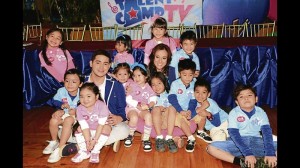A recent telecast of “I-Shine Talent Camp” (GMA 7) purported to teach the kiddie tilt’s little finalists how to act—but ended up showing why many child performers on local TV do so badly as actors.
First problem was the choice of performance material: As introduction to the art and craft of acting, the tilt chose to subject its tiny finalists to a gargantuan challenge—to come up with a short monologue in which they prayed to God to heal their sick mothers.
Expectedly, the kids went all sniffly and whiny as they were rehearsed by “stage parents” to come up with pathetic and bathetic performances that tugged at heartstrings, even as their “mentors,” led by Gina Alajar, ingratiatingly cooed over their “felt” portrayals.
The material and performance “attack” were, oh, so wrong. This is the sort of rigorous and demanding acting challenge that young actors attempt to do at the end of a four-month acting workshop, not after one itty-bitty “lesson.” In addition, the overly “heightened” and emotional approach gave the TH types the wrong notion of what “good acting” should be.
Of course, the “mentors” will protest, “But this is the sort of emotional scene that they will be required to do on TV.”
True, but an introductory acting lessons is supposed to give young would-be actors a strong and clear foundation in simple believability, not high-flying histrionics.
This example of excessive overreaching shows why many local child actors do so badly: They are trained to go for effect, not for believable motivation—which should be at the heart and soul of all truly affecting and empathetic performances.
In addition, most of the “Talent Camp” kids were rehearsed by “stage parents” to be “talky” in the way they expressed to God how sad and miserable they were. This is one of the most off-putting aspects of child performers’ portrayals in these parts: They talk a blue streak, like very wise little adults, instead of the tots they really are. Again, not at all believable.
If “Talent Camp” continues to “teach” in this misguided way, it will end up producing, not the talented, well-trained young performers it seeks to graduate, but more of the same superficially sniffly or smiley or shouty stuff that we already get too much of. Where’s the improvement in that?
To be effective, an acting workshop for children has to first make them understand that “acting” is believing and being—not “acting” at all.
Instead of starting off with a difficult psychological challenge like praying for a desperately sick parent, the workshop participant should first be made to believe and express his or her genuine thoughts and feelings about something much simpler and yet ultimately more true.
And, since they’re kids, it would be even better if the scene decided was a happy one, instead of a six-handkerchief, all-out “emo” display.
The mentors may scoff, “But attention-calling melodrama is what’s required on local TV, not ‘happy’ moments!” Precisely. And that’s why our hapless, little child actors do so poorly.


